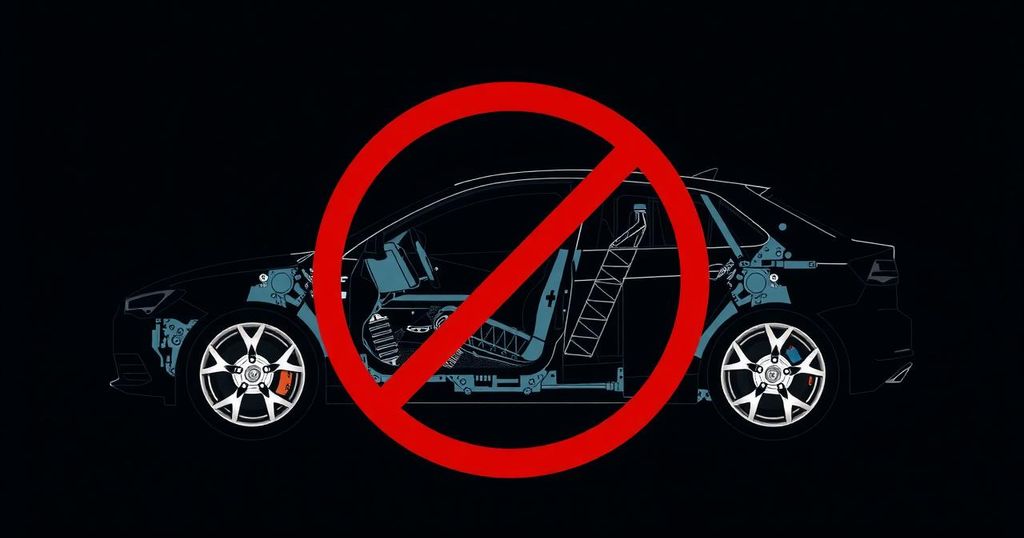Biden Administration Proposes Ban on High-Tech Chinese Vehicle Technology
The Biden administration has proposed a ban on the sale of vehicles containing significant components and software from China and Russia, citing national security concerns related to internet-connected vehicle technologies. The draft regulation initiates restrictions on software starting in model year 2027 and on hardware in model year 2030. The proposal emphasizes proactive measures to mitigate risks as fears of foreign influence in the automotive sector rise ahead of the 2024 presidential election, while seeking input through a 30-day public comment period.
The Biden administration has proposed a critical regulation that would prohibit U.S. automakers from selling vehicles equipped with significant components and software sourced from China and Russia. This initiative arises from potential national security threats linked to internet-connected vehicle technologies from these countries, highlighted by an investigation launched by the U.S. Department of Commerce in February. Commerce Secretary Gina Raimondo emphasized the inherent risks, stating: “Cars today have cameras, microphones, GPS tracking, and other technologies connected to the internet. It doesn’t take much imagination to understand how a foreign adversary with access to this information could pose a serious risk to both our national security and the privacy of U.S. citizens.” The proposed regulations aim to curb China’s growing influence in the automotive sector as the 2024 presidential election approaches, a period during which both major parties demonstrate a united front against Chinese advancements. According to the proposed timeline, restrictions on software will begin in the model year 2027, while hardware restrictions will follow suit either in 2030 or by January 1, 2029, for non-model year units. The administration indicates that the relatively low current presence of Chinese and Russian vehicles in the U.S. market justifies these proactive measures. Experts participating in this regulation’s drafting mentioned that automotive leaders had provided feedback ensuring the timelines reflect real-world capabilities. Furthermore, Ms. Raimondo clarified that this regulation is fundamentally about national security rather than economic competition, despite perceptions to the contrary among industry participants. The director of the National Economic Council, Lael Brainard, reinforced this position, stating: “We can’t allow for a situation where our auto supply chains are dependent on China.” The draft regulation will undergo a 30-day public comment period before being finalized, with senior officials expressing hopes for its establishment prior to President Biden’s departure from office in January.
In recent years, concerns regarding national security and data privacy related to foreign technology have intensified, particularly with regard to China. The rise of internet-connected vehicles – equipped with advanced technologies such as GPS, cameras, and microphones – has raised alarms about the vulnerability these systems may present against foreign adversarial actions. The current geopolitical climate emphasizes a strategic reevaluation of reliance on foreign technology in critical sectors, particularly in the automotive industry, which is experiencing significant changes due to technological advancements. The proposed regulation aims to mitigate these risks and ensure the safety and privacy of American citizens as well as the integrity of the nation’s infrastructure.
In conclusion, the Biden administration’s proposal to ban certain high-tech vehicle components and software from China and Russia reflects a robust approach toward safeguarding national security amidst evolving technological risks. The regulations are intended to preemptively address potential security vulnerabilities inherent in connected vehicles. As public commentary progresses, the focus will be on balancing timely compliance with the automotive industry’s adaptation to these new national security measures while ensuring the competitive integrity of the U.S. automotive market.
Original Source: www.detroitnews.com








Post Comment